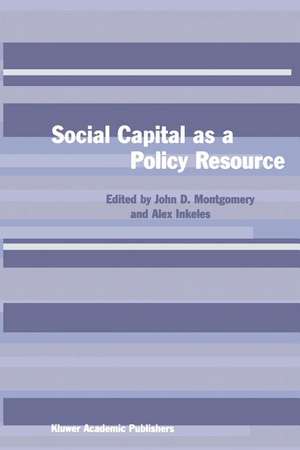Social Capital as a Policy Resource
Editat de John D. Montgomery, Alex Inkelesen Limba Engleză Paperback – 3 dec 2010
| Toate formatele și edițiile | Preț | Express |
|---|---|---|
| Paperback (1) | 387.75 lei 6-8 săpt. | |
| Springer Us – 3 dec 2010 | 387.75 lei 6-8 săpt. | |
| Hardback (1) | 394.12 lei 6-8 săpt. | |
| Springer Us – 30 apr 2001 | 394.12 lei 6-8 săpt. |
Preț: 387.75 lei
Nou
Puncte Express: 582
Preț estimativ în valută:
74.19€ • 77.67$ • 61.39£
74.19€ • 77.67$ • 61.39£
Carte tipărită la comandă
Livrare economică 05-19 aprilie
Preluare comenzi: 021 569.72.76
Specificații
ISBN-13: 9781441948717
ISBN-10: 1441948716
Pagini: 292
Ilustrații: VIII, 280 p.
Dimensiuni: 155 x 235 x 15 mm
Greutate: 0.41 kg
Ediția:Softcover reprint of hardcover 1st ed. 2001
Editura: Springer Us
Colecția Springer
Locul publicării:New York, NY, United States
ISBN-10: 1441948716
Pagini: 292
Ilustrații: VIII, 280 p.
Dimensiuni: 155 x 235 x 15 mm
Greutate: 0.41 kg
Ediția:Softcover reprint of hardcover 1st ed. 2001
Editura: Springer Us
Colecția Springer
Locul publicării:New York, NY, United States
Public țintă
ResearchCuprins
Social capital as a policy resource.- Measuring social capital and its consequences.- Both glue and lubricant: Transnational ethnic social capital as a source of Asia-Pacific subregionalism.- Social capital in the Japanese youth labor market: Labor market policy, schools, and norms.- Social capital and labor politics in Japan: Cooperation or cooptation?.- Social capital and power: Entrepreneurial elite and the state in contemporary China.- Trade unions and social capital in transitional communist states: The case of China.- Faith as social capital: Religion and community development in Southern Asia.- Native social capital: The case of Hawaiian sovereignty and Ka Lahui Hawaii.- Indigenous knowledge as intellectual property.- The World Bank and social capital: Lessons from ten rural development projects in the Philippines and Mexico.- Social capital in microfinance: Case studies in the Philippines.- Peasant federations and rural development policies in the Andes.- Social capital formation: The role of NGO rural development programs in Bangladesh.- Beyond community and society: The externalities of social capital building.- About the authors.
Recenzii
`Few terms can match social capital's achievement of facilitating dialogue across sectors, regions, and disciplines. While maintaining a critical sensibility, these essays showcase the versatility, rigor, and usefulness of social capital scholarship at its best.'
Michael Woolcock - World Bank
`How may the connectedness among human beings help to advance important collective goals? This comprehensive book examines the sources of social capital in ethnic, religious, residential, occupational and other affinities. More importantly, it assesses how social capital influences such diverse endeavors as transnational entrepreneurship, the performance of high school students, the workings of labor markets and the efficacy of labor and peasant unions, and the outcomes of World Bank projects, among other topics. The book's reach across East Asia and beyond, and its focus on empirical case research, makes it a splendid fountain of comparative information and analysis on one of the key scholarly and practical topics of our time.'
Jorge Dominguez - Harvard University
`Rarely is a collection as timely or as useful. Anyone concerned with setting policy will find extraordinarily interesting this insightful treatment of a subject which is giving many of us considerable trouble. Here are enough new ideas to spark a dozen doctoral theses and a gross of journal articles.'
Paul Rich - Professor of International Relations and History University of the Americas, Fellow, Hoover Institution, Stanford University
`This important collection of papers examines how social capital has been used to advance social policies - or alternatively, how social capital has complicated the implementation of social policies &endash; in nations on both sides of the Pacific. The cases range from India's Andaman Islands and Russia in Asia to the Andes, and prominently include China, Japan, and Southeast Asia along the way. They are based on first-hand field research in the areas, and serve as the platform for important synthesizing articles by the editors. This book extends our understanding of the increasingly important concept of social capital, and is a contribution to theory as well as to our knowledge of policy processes in the nations of the Pacific.'
Nathan Glazer - Professor of Sociology and Education, Emeritus, Harvard University
`Montgomery and Inkeles compile a unique and comprehensive overview of the uses of social capital as a policy resource. The remarkable breadth of studies of social capital in Pacific Basin countries and of its manifestations in ethnic groups, labor unions, entrepreneurial ventures, educational institutions, micro-finance organizations, rural federations, NGOs, and religious groups provide new perspectives on its crucial roles in economic, social, and political development. The editors and authors of this fascinating collection of studies offer convincing arguments that social capital may, indeed, be the real wealth of nations. Students of the social sciences and the policy sciences alike will benefit from the encyclopedic coverage of how social capital contributes to public policy and human dignity around the world. The volume can give policymakers new insights into ways of building social capital and enhancing its use for social progress and will provide scholars a strong foundation for research on social capital for years to come.'
Dennis A. Rondinelli - Glaxo Distinguished International Professor of Management, University of North Carolina at Chapel Hill
Michael Woolcock - World Bank
`How may the connectedness among human beings help to advance important collective goals? This comprehensive book examines the sources of social capital in ethnic, religious, residential, occupational and other affinities. More importantly, it assesses how social capital influences such diverse endeavors as transnational entrepreneurship, the performance of high school students, the workings of labor markets and the efficacy of labor and peasant unions, and the outcomes of World Bank projects, among other topics. The book's reach across East Asia and beyond, and its focus on empirical case research, makes it a splendid fountain of comparative information and analysis on one of the key scholarly and practical topics of our time.'
Jorge Dominguez - Harvard University
`Rarely is a collection as timely or as useful. Anyone concerned with setting policy will find extraordinarily interesting this insightful treatment of a subject which is giving many of us considerable trouble. Here are enough new ideas to spark a dozen doctoral theses and a gross of journal articles.'
Paul Rich - Professor of International Relations and History University of the Americas, Fellow, Hoover Institution, Stanford University
`This important collection of papers examines how social capital has been used to advance social policies - or alternatively, how social capital has complicated the implementation of social policies &endash; in nations on both sides of the Pacific. The cases range from India's Andaman Islands and Russia in Asia to the Andes, and prominently include China, Japan, and Southeast Asia along the way. They are based on first-hand field research in the areas, and serve as the platform for important synthesizing articles by the editors. This book extends our understanding of the increasingly important concept of social capital, and is a contribution to theory as well as to our knowledge of policy processes in the nations of the Pacific.'
Nathan Glazer - Professor of Sociology and Education, Emeritus, Harvard University
`Montgomery and Inkeles compile a unique and comprehensive overview of the uses of social capital as a policy resource. The remarkable breadth of studies of social capital in Pacific Basin countries and of its manifestations in ethnic groups, labor unions, entrepreneurial ventures, educational institutions, micro-finance organizations, rural federations, NGOs, and religious groups provide new perspectives on its crucial roles in economic, social, and political development. The editors and authors of this fascinating collection of studies offer convincing arguments that social capital may, indeed, be the real wealth of nations. Students of the social sciences and the policy sciences alike will benefit from the encyclopedic coverage of how social capital contributes to public policy and human dignity around the world. The volume can give policymakers new insights into ways of building social capital and enhancing its use for social progress and will provide scholars a strong foundation for research on social capital for years to come.'
Dennis A. Rondinelli - Glaxo Distinguished International Professor of Management, University of North Carolina at Chapel Hill












